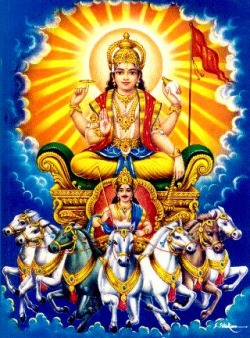
Pongal day is the New Year festival of Solar Calendar in Siddha tradition of South India.The modern science has made it clear that without the Sun, no life can exist on the Earth. In India, the Sun-worship is prevalent from time immemorial. In traditional Indian calendar, there are 2 solstices. One is the northward movement of the Sun and the other is the southward movement. The north movement starts somewhere in January, hence the most important one as per as the renewal of the world is concerned. It is called the dawn for the God and Goddesses.

With the end of the wet month of Margazhi (mid December to mid January) the new month of Thai (mid January to mid February) heralds a series of festivals. The first day of this month is a festival day known as "Pongal Day". Pongal means the "boiling over" of milk and rice during the month of Thai. This year it starts from January 15th.
The act of boiling over of milk in the clay pot is considered to denote future prosperity for the family.
People celebrating Pongal should be aware of the meaning & significance of the important rituals associated with this harvest festival. Pongal or Thai Pongal is also called Makara Sankaranthi, since it is celebrated on the first day of Thai when the Sun enters the Makara Rasi (Capricornus). This signals the end of winter and the onset of spring throughout the northern hemisphere. For the next six months, the days are longer and warmer. The Sun begins its journey northward as it transits into the constellation of Makaram (Capricorn), signaling the return of ever increasing daylight and the Sun going to start drive out the darkness.
This transit is a powerful opportunity to change your old ways and rewrite the rules for the next year. Your old ways might not have brought you the affluence or poignant happiness that you have been yearning for. The celebrations associated with this transit carry a strong vibration which can stir up your awareness and help you receive what you rightly deserve.
Accelerating the benefic effects of the Sun using remedies can augment your good luck time, like sailing with the wind at your back.
Customs & Celebrations of Pongal festival
The morning of January 14th prior to the transit is the time to clean your homes and your mind. Clean your closets and throw out old items from the past that no longer has a place in your life. Spiritually this is the time to overhaul of your current self and getting ready for a higher self. This festival celebrates leaving behind the old way of doing things, be it relationship, money matters or health habits.
Pongal
Pongal generally includes customs & celebrations that are the expression of jubilation over life's renewal. On Thai Pongal, the family begins the day early. Every member of the family gets up early in the morning, bathes, puts on new clothes and gathers to cook the traditional Pongal (rice pudding). The front garden is pre-prepared for this ceremonious cooking. A flat square pitch is made and decorated with kolam drawings, and it is exposed to the direct sun light. A fire wood hearth will be set up using three bricks. The cooking begins by putting a clay pot with water on the hearth.
It is interesting to know that even Indra, the king of heaven, rejoices during this time of abundance, fun, luxury and happiness.
A senior member of the family conduct the cooking and the rest of the family dutifully assists him or her or watches the event. When the water has boiled the rice is put into the pot - after a member the family ceremoniously puts three handful of rice in first. The other ingredients of this special dish are chakkarai (brown cane sugar) or katkandu (sugar candy), milk (cow's milk or coconut milk), roasted green gram (payaru), raisins, cashew nuts and few pods of cardamom. When the meal is ready it is first put on a banana leaf and the family pray for few minutes to thank the Sun. Then the meal (Pongal) is served among the family.
New clothes: Traditionally, the New Year is always begun by wearing new clothes, because it denotes that you have a steady flow of new clothes throughout the year
Clocks: Watches and clocks are corrected in order to endow the house with good fortune and also to ensure good times a head!
Breakage: Crying or breakage things on a New year day is considered inauspicious. It is believed in order to avoid setting the same pattern for the rest of the year.
Storing up: Wallets and purses are filled up with money and kitchen cupboards are stocked up with food, as they are believed to bring prosperity in the year ahead. It is believed that empty pockets or empty cupboards portend a sign of poverty!
~ By Vijayakumar Alagappan #www.iksacademy.com #Ondre Kulam Endru Paduvom, Oruvane Devan Endru Potruvom #Anbe Shivam#Shivoham
"Wishing Everyone Happy Ponggal and a New Year. May all your wishes come true and GOD bless you with Greater Health, Prosperity and Enlightenment this year !" ~ from IKS Academy Team



It is very excellent effort. Keep it up dear, for sake of Hunduism
ReplyDelete